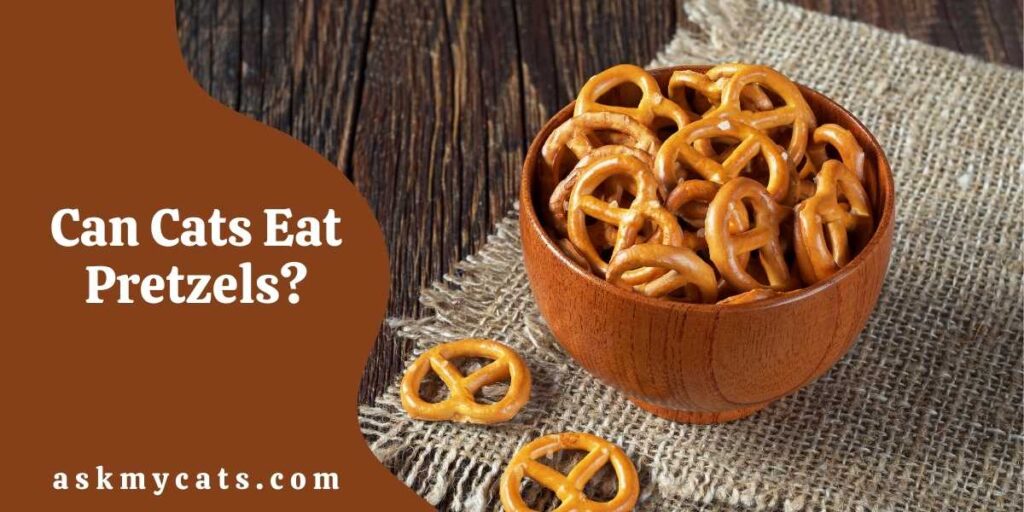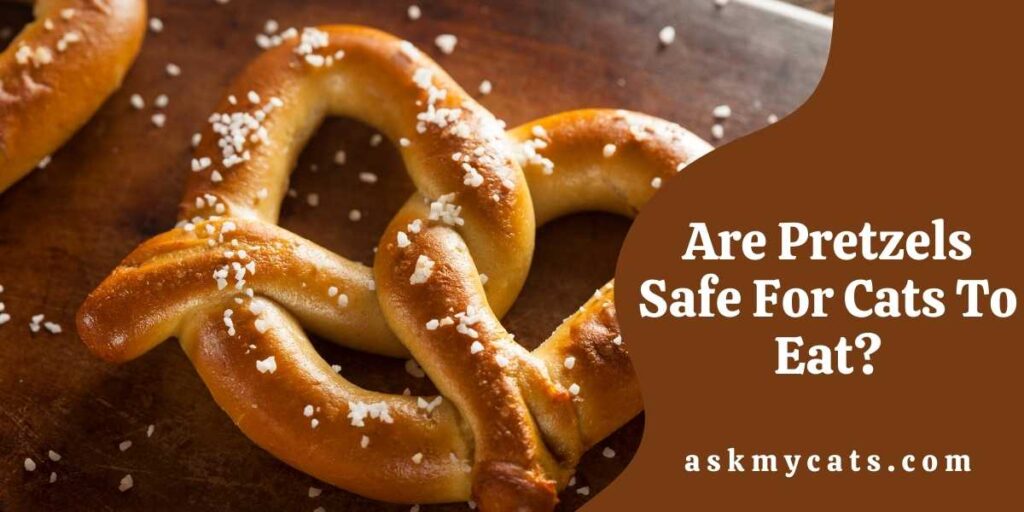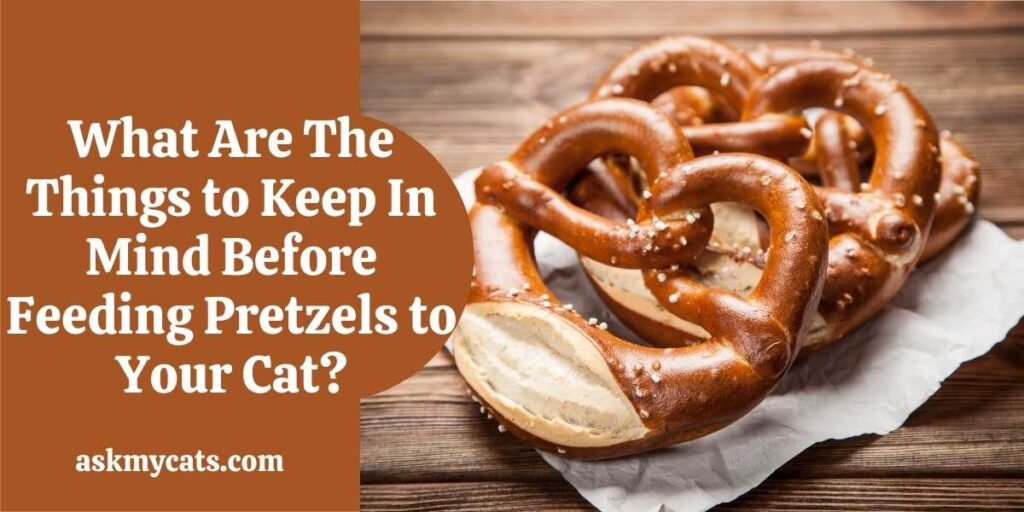Cat owners all around the world are continuously looking for new methods to spice up their cats’ diets. Adding healthy foods to your feline friend’s diet is a terrific approach to help them live longer and healthier lives.
However, it’s crucial to be aware of the foods that are potentially harmful to cats but are safe for humans.
So, can cats eat pretzels?
Yes, cats can eat pretzels, but only in moderation. The majority of pretzels are safe for cats to eat. Wheat flour, water, yeast, shortening, and salt are the main ingredients in pretzels. When all of these foods are prepared correctly, your cat can eat them in moderation.
This article will provide you with more information about cats eating pretzels.


Give Your Cat the Perfect Day
Get the Free Ebook!
What Is A Pretzel?
A pretzel is a type of baked pastry made from dough that is commonly shaped into a knot.
The original pretzel shape is symmetrical, with the ends of a long strip of dough interlaced and twisted back on itself in a specific way. Pretzels are now available in a variety of shapes.
The most frequent seasoning for pretzels is salt, which works in tandem with the washing soda or lye treatment that gives pretzels their traditional skin and flavour thanks to the Maillard reaction.
Mustard, cheeses, sugar, chocolate, cinnamon, sweet glaze, seeds, and nuts are some of the other ingredients.
Soft pretzels, which should be eaten right away after preparation, and hard-baked pretzels, which have a longer shelf life, are two types of pretzels.
Southern German and Swiss German immigrants brought the pretzel to North America in the late 1800s.
The immigrants became known as the Pennsylvania Dutch, and as the pretzel’s popularity grew, so did the number of handcrafted pretzel bakeries that dotted the central Pennsylvania countryside.
Soft pretzels grew popular in different parts of the United States over the twentieth century. Soft pretzels were famous in cities like Philadelphia, Chicago, and New York.
The introduction of new industrialized-era mass production methods, which increased availability and quantity, as well as the opening of multiple points of distribution at schools, convenience and grocery stores, and entertainment venues such as movie theatres, arenas, concert halls, and sports stadiums, were critical to success.
Previously, street vendors sold pretzels in wooden glass-enclosed cabinets on street corners.
Are Pretzels Safe For Cats To Eat?
Yes, pretzels are safe for cats to eat but only in moderation, and not as their primary diet.

Pretzels, a popular human snack, are baked snacks with a sprinkling of salt on top.
You may find them addictive, but can your cat enjoy them with you?
Yes, your cat can eat pretzels as a treat, but not as a regular meal.
The majority of pretzels are safe for cats to eat. Wheat flour, water, yeast, shortening, and salt are the main ingredients in pretzels.
When all of these components are prepared correctly, your cat can eat them in moderation.
But before you feed those enticing morsels to your cat, read the ingredient list carefully. Some pretzels contain seasonings like garlic or onion powder, which are irritating to a cat’s digestive tract even in powder form and should be avoided.
Although sweet pretzels are unlikely to attract your cat (cats are unable to detect sweet flavors), chocolate-covered pretzels and pretzels containing the substance Xylitol should not be fed to your cat. These compounds are also poisonous to cats if consumed.
When it comes to feeding grain products to your cat, there are usually two factions. Some people argue that grains aren’t a “natural” food for cats in the wild, hence they shouldn’t be fed to them.
However, according to some experts, it shouldn’t be assumed that wild cats eat food tailored to their nutritional requirements.
It is said that feeding grains to your cat are fine because grains are a good source of vitamins and energy for your cat.
If your veterinarian has advised you to keep your cat’s diet free of grains, stay away from pretzels.
If your cat is having undiscovered digestive problems, your veterinarian may tell you this. Some cats are sensitive to grains, but most healthy cats are not.
What Are The Things to Keep In Mind Before Feeding Pretzels to Your Cat?
The following are the things you should keep in mind before feeding pretzels to your cat: –

1. Avoid Overfeeding
It turns out that your feline friend enjoys pretzels, which makes introducing the food to the cat a breeze. But why are cats so fond of pretzels?
Pretzels are visually appealing, have a pleasant aroma (depending on the ingredients used), and melt easily in a cat’s mouth. Cats are drawn to pretzels because of this combination.
However, you should keep an eye on your cat’s pretzel obsession to ensure that it does not devolve into addiction and uncontrollable cravings.
Regardless of how well your cat tolerates pretzels, you should only give it to him as a treat on rare occasions. Pretzels should not be used in place of your cat’s regular diet.
2. Always Check The Ingredients
Pretzels may blow your cat away, but if you feed the food to your feline friend carelessly, you can expect some serious side effects.
In addition to giving pretzels to cats in moderation, you should check the ingredients list to ensure that all of the ingredients are safe for cats.
As previously stated, modern pretzels can be made with a variety of ingredients. In addition, if the pretzel is commercially prepared, you should carefully read the ingredients list before purchasing the product.
Some common pretzel ingredients that may be toxic to your cat are as follows:
a. Salt
Dehydration is caused by salt, which most commonly manifests as frequent thirst and urination.
Excess salt consumption can result in sodium ion poisoning, a condition characterized by gastrointestinal symptoms such as diarrhea and neurological symptoms such as seizures and tremors.
The cat could die from sodium ion poisoning if left untreated. So, do cats like salted pretzels? The answer is emphatical no.
b. Spices
Garlic and onions are two of the most widely used spices in various cuisines around the world.
Although they add a mouthwatering flavor and aroma to pretzels, even a trace amount of either spice is highly toxic to cats.
The spices cause garlic or onion poisoning, which are both fatal medical conditions characterized by gastrointestinal distress and anemia-like symptoms.
c. Sweeteners
The two most common sweeteners used in pretzels are sugar and chocolate, but neither is safe for cats.
Obesity and weight gain, diabetes, cardiovascular problems, and oral diseases are all risks associated with sugar and chocolate.
Unsweetened pretzels are sold in some stores. However, don’t be fooled by the marketing hype; unsweetened foods typically contain Xylitol, a chemical that is still toxic to cats.
d. Cheese
Cheese, though not as common as the other pretzel ingredients, is just as bad for cats as salt, spices, and sweeteners.
The most immediate health concern to be concerned about is weight gain. Furthermore, cheese may cause feline gastrointestinal distress, particularly because it contains lactose, and most adult cats are lactose intolerant.
3. Keep An Eye Out For Choking Hazards
Even if all of the ingredients used to make a pretzel are safe for your cat, be wary of choking hazards.
Pretzels are classified as soft or hard based on how soon they should be consumed after being prepared.
Can cats consume hard pretzels? Hard pretzels, as you might expect, will most likely result in choking. What about soft pretzels? Can cats eat them?
Soft pretzels are a better choice for cats because they pose less of a choking hazard. However, keep in mind that hard or soft pretzels often contain seeds and nuts, which can pose choking hazards for your pet.
Pretzels should not be eaten by cats with sensitive stomachs or those with suppressed immune systems. Kittens, elderly cats, pregnant and nursing cats, and sickly cats are all included.
4. Always Choose Healthy Alternatives
If you’re set on giving your cat pretzels, insist on healthier alternatives. Consider pretzels, which are made without any artificial colours, flavours, corn, wheat, or soy.
Alternatively, you could try these pretzels, which are low in calories and will keep your feline friend from gaining weight.
And you can also go for probiotic-infused healthy pretzel alternatives, which is a great choice. Probiotics feed your cat’s gut-friendly bacteria, which helps the animal’s digestion.
Can Cats Eat Flavoured Pretzel Sticks?
Yes, cats can eat flavoured pretzel sticks but only in moderation.

Pretzel sticks are made with the same ingredients as traditional pretzels, but they differ in size and shape.
Pretzel sticks come in a variety of flavours, and not all of them are suitable for cats.
You should stay away from the most common chocolate-flavoured pretzel sticks. Chocolate contains theobromine, a toxin that is harmful to your pet’s health.
Sour cream and onion-flavored pretzel sticks should never be fed to cats because onions are poisonous to them.
The pretzel sticks with chopped nuts and a variety of tasty sprinkles may appear appealing, but they are toxic to your cats.
Even cheddar cheese-flavoured pretzel sticks are not better for cats because they contain dairy.
Pretzel sticks with spices, butter, and artificial flavors are not toxic, but they are also not healthy.
You can give your cat one or two gluten-free, unsalted pretzel sticks. If consumed in moderation, these are not harmful.
Can Kittens Eat Pretzels?
No, kittens cannot eat pretzels.
Do not feed your kittens pretzels. They are sensitive and underdeveloped.
Kittens’ stomachs are not fully developed and can’t eat pretzels. Aside from that, kittens require essential nutrients for growth, body development, and activity. However, pretzels do not contain the necessary nutrients.
These glazed crackers are not suitable for pregnant or nursing cats. Feeding pretzels to senior or sick pets is not a good idea.
Furthermore, pretzels are not the best option for cats with food allergies, sensitive stomachs, or compromised immune systems.
Frequently Asked Questions
How many pretzels can I feed my cats?
Many furry friends enjoy the aroma and flavour of pretzels. Just because your cat enjoys these glazed crackers does not mean you should feed them on a daily basis. Overeating pretzels can lead to digestive issues. Furthermore, your cat may become obese, leading to a sedentary lifestyle. One or two small pretzels once or twice a month are safe and will not harm you.
Is the salt presence in pretzels safe for cats?
If they give their cats pretzels, some cat parents may be concerned about feeding them too much salt. Though high sodium levels in the bloodstream can be fatal for cats with cardiovascular or kidney illness, taking enough salt to cause harm would be practically hard for a cat to do. There were no detrimental effects in research where a cat was given three times the daily recommended dosage for almost two years. So, it turns out that keeping an eye on your cat’s sodium consumption isn’t all that vital. In fact, it could be preferable for her to have some salty snacks to stimulate her thirst for additional water. Cats are notorious for not drinking enough water to keep their urinary tracts healthy, therefore adding salt to their diet might boost their thirst and water consumption, preventing UTIs.
Do cats like salted pretzels?
It’s difficult to predict whether a cat will enjoy salted pretzels. Most cats have never shown much interest, but then again, neither do they care for the food we people eat. Other cats have been known to smell, lick, and even steal pretzels, so a cat’s personality is a big factor. Salted pretzels may appeal to cats for two reasons: the salt, which cats crave in the same way as people do, but in much lesser amounts, and the crunchy texture, which many cats appreciate. Because pretzels don’t fall apart easily, they might be amusing for certain cats to bat around and pursue. As a result, there could be a variety of reasons why your cat prefers pretzels.
Final Words
Allow your cat to eat those pretzels now and again. Salty treats, such as pretzels, can provide your cat with a delightful treat, a burst of energy, and encourage them to drink more water.
But go easy on the “people snacks” when it comes to feeding her. Feeding your cat non-cat food on a regular basis can be hazardous to her health. As they say, everything is in moderation.
If you have any questions, ask us in the comments section.
